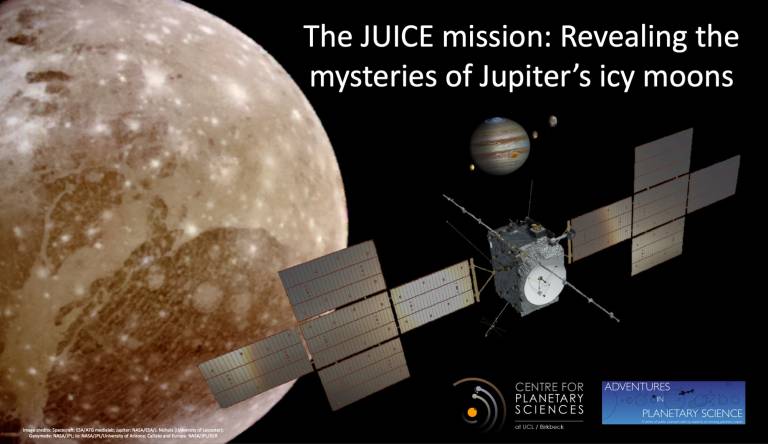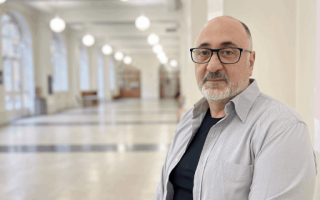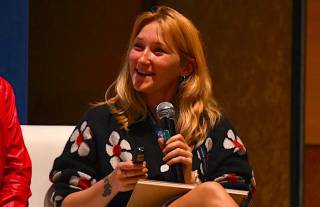
The Centre for Planetary Sciences at UCL/Birkbeck is delighted to announce the third event in our Adventures in Planetary Science public engagement series 'The JUICE mission: Revealing the mysteries of Jupiter's icy moons', taking place online on Thursday 25th May 2023.
This event is free.
Event Information
Open to
- All
Availability
- Yes
Cost
- Free
Organiser
-
Joanna Fabbri, Scientific Officer for the Centre for Planetary Sciences at UCL/Birkbeck
ESA’s Jupiter Icy Moons Explorer mission - JUICE - successfully launched on 14th April and is now on it's way to make detailed observations of the giant gas planet and its three largest moons, Ganymede, Callisto and Europa all of which are believed to be harbouring subsurface oceans. But what is the mission hoping to discover? What secrets lie beneath the icy surface of Jupiter’s moons? Could they hold the conditions for life?
The next event in our 'Adventures in Planetary Science' series aims to enlighten you about the mission with talks from our planetary science, astrobiology and JUICE experts, and a chance to delve deeper by putting your questions to the panel during the Q&A session.
This will be a virtual event held online with Zoom.
Don't miss out! Register for your free tickets on Eventbrite via the 'Book now' button above.
Introducing our experts...
Professor Nicholas Achilleos (Physics & Astronomy, UCL)
Nick Achilleos is a Professor of Planetary Physics in the Department of Physics and Astronomy, and the Vice-Dean for Equality, Diversity and Inclusion (EDI) in the Faculty of Mathemetical and Physical Sciences (MAPS) at UCL. He is also the current Director of The Centre for Planetary Sciences at UCL/Birkbeck. Nick’s current research interests broadly cover the magnetospheres and ionospheres of the giant planets Jupiter and Saturn and how these systems are coupled together. Previously, he has been a mission planner and science co-investigator for the magnetometer instrument onboard the Cassini spacecraft. Currently, he is a science co-investigator for the JMAG magnetometer team for the JUICE (JUpiter ICy moons Explorer) mission. Nick was awarded the Royal Astronomical Society 2023 Chapman Medal for outstanding research on the magnetospheres of Jupiter and Saturn.
Professor Geraint Jones (Mullard Space Science Laboratory, UCL)
Geraint Jones is Professor of Planetary Science and Head of the Planetary Science Group at University College London’s Mullard Space Science Laboratory. Following a first degree and PhD in Astronomy at UCL, he worked at Imperial College London, NASA’s Jet Propulsion Laboratory, and the Max Planck Institute for Solar System Research, before returning to MSSL in 2007. His primary research interests are the icy moons of the outer planets, and comets. Geraint has worked on numerous missions, including Cassini-Huygens, Solar Orbiter, the ExoMars Rosalind Franklin rover, and the JUICE mission to Jupiter. He also led the recently-approved ESA Comet Interceptor mission, due for launch in 2029. He is enthusiastic about the communication of science, and is responsible for the scientific webcomic astrojots.com.
Grace Richards (The Open Univeristy)
Grace Richards is a third year PhD researcher in the School of Physical Sciences and the AstrobiologyOU group at the Open University, UK. The title of her thesis is “The feasibility of in situ VOC analysis on icy moons”, with her project focusing on the icy surface of Enceladus, and whether or not it is possible to differentiate between surface processes by analysing the ice. She has built a cryogenic vacuum system to replicate the Enceladus surface environment and grow ice analogues. She is also working with the Light Gas Gun to simulate impacts from grains in Saturn's E-ring on the ice analogues. Her main interests are the habitability of icy moons, space instrumentation, the identification and detection of biomarkers, and space weathering. Grace is an avid science communicator and is currently working with AstrobiologyOU on creating educational videos about astrobiology and planetary science for schools and science festivals.
Dr Andrew Rushby (Birkbeck, University of London)
Andrew Rushby is a Lecturer in Astrobiology at Birkbeck. Andrew’s interest in the climates of newly discovered exoplanets, particularly small and rocky worlds, started during graduate studies at the University of East Anglia, which was followed by postdoctoral fellowships at NASA Ames Research Center and the University of California, Irvine. Andrew has joined Birkbeck/UCL-CPS to continue his research into the habitability of small planets outside of our Solar System, and to develop a new postgraduate degree in Astrobiology, launching in October 2023, which will be one of the first of its kind in the UK. Andrew is also a passionate science communicator. He co-hosts the Exocast podcast, which discusses all things related to exoplanetary science and astrobiology.
Links





 Close
Close

